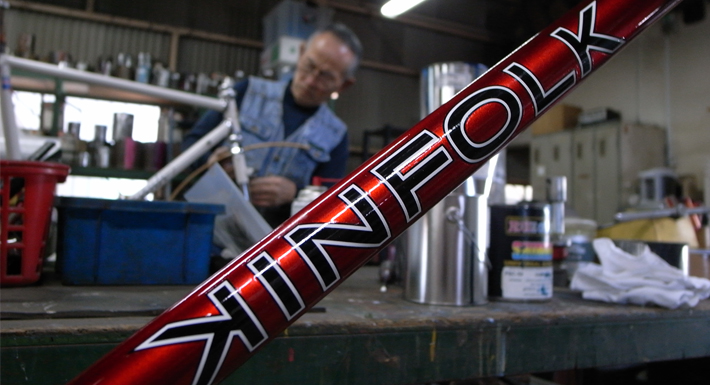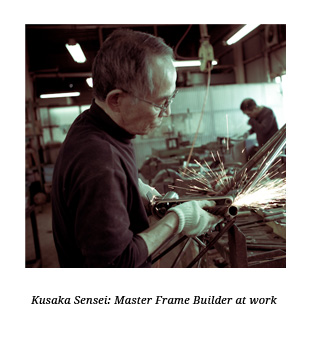The narrow streets of Naka-Meguro are at the center of a bicycle revolution. On the second floor, of a wooden shack is Kinfolk, a tiny lounge dedicated to the purest form two wheeled transport.
Kinfolk are Akira, John, Maceo, Ryan and Salah, a group of international friends obsessed with the geometry and build of classic Japanese bike frames. Winners of Wallpaper* magazine’s “Best ride” award in 2010 and star of Nike’s “tied together” campaign, the tiny company assemble exclusive, bespoke bicycles that are hand crafted to the highest standards here in Japan.
While bicycles are everywhere in Tokyo, the mass produced cheap and cheerful mamachari are slowly being replaced by expensive, custom frames with one of a kind paint jobs and decals—once obscure vehicles that are now taking the world by storm. But this revolution is not about money, it is all about the love of craftsmanship—and the freedom of the road.
Shuichi Kusaka-sensei is Kinfolk’s 72 year old master frame builder. Based in Akashi, a small industrial seaside town near Kobe, Kusaka has been crafting steel bicycle frames for over 30 years, his workshop is staffed by a small team consisting of a painter, a polisher and one young apprentice.
“We are very honored to have him build frames at the end of his career—he hasn’t changed at all despite the fame (caused by a recent surge in popularity worldwide), he works on bikes monday to friday—and the goes fishing at the weekends”, says John.
Kinfolk gained mainstream coverage when the brand starred in Wallpaper* magazine’s ‘Hand Made’ edition, and a special exhibition at Salone del Mobile in Milan, the UK design bible called the brand “the rising stars of bespoke bike building”.
Kinfolk created a special ‘international bike’ that could break into two pieces “It can be out in a leather suitcase instead of a bulky bike bag or box”. The company actually produced two bikes that were sent to a specialist powder coater in Portland, Oregon for the finest finish, a bespoke leather bag, was made to carry the bikes, and a leather engraver was hired to make custom designed saddles—emblazoned with the Wallpaper* logo. The bike just made it to Milan just in time for the show, after a long journey from Japan via the USA. After the show, the bikes finally reached the UK, were they were photographed for the magazine.
Another media coup came from Nike, the sportswear giant approached Kinfolk in the run up to the 2010 South Africa world cup, the “Tied together” campaign was a charity street sports event bringing together a cyclist, jogger, skater and photographer (to document the event) raising money for the (RED) AIDS foundation, the event took place in Tokyo and made its way around the world to finish in Johannesburg, South Africa. The guidelines for constructing the bike were simple: Use the colors of the Japanese flag and fit it to Tokyo’s most famous bike messenger, Shino. The whole process was filmed by Nike and the bike featured in a special window display at Nike stadium in Tokyo. More recently, trendsetters Hypebeast.com visited the bar and offered to collaborate on a blog, adding even more to the buzz.
In the first year of business orders came mainly America, then the exchange rate between U.S. dollar and Yen slowed trade down, the second year orders poured in from Europe and South East Asia—and in the winter from Australia. “We just sent one to Germany, so we are growing internationally”, the rising popularity abroad, particularly in the U.S. is one reason the brand is going global, by the end of summer the new Kinfolk store will open in Brooklyn, New York with an upstairs office taking care of the business and creative sides and a downstairs cafe and bar so refresh all those tired cyclists. “It took a lot to set a bar up in New York, it was surprisingly easier here in Tokyo”.
To begin with Ryan would visit bike shops around rural Japan, buy up vintage frames and take them back to the US to sell for a profit, a hobby that paid for the airline ticket and more. Three years ago prices increased due to a surge in popularity and suddenly fewer frames were on offer, the Kinfolk team still wanted to be involved in the industry and spent a lot of time at shops talking to bike dealers.
“We had ideas of approaching builders to collaborate on a brand, but they were very humble. We aimed at audiences outside Japan, no-one was doing the same thing, basically the frame builders are very traditional, they use a telephone and maybe a fax, no computers or email”, if a foreigner wanted to buy a Japanese frame they would have to physically fly to Japan and order one—in Japanese.
“The frame builders don’t care about an audience overseas, or fame or fortune”, unless you could speak Japanese you simply couldn’t order one, “enthusiasts would have to hope to find one on eBay and hope the color, and price was reasonable and it was a decent fit”.
This scarcity encouraged the group of bike nuts to create a brand that bridged the gap between the traditional craftsmen of Japan and bicycle purists abroad. Strangely, as Kinfolk frames became popular in New York, Japanese kids were eager to buy them back home, closing the loop back with Japan.
“The lounge by day is an office, and bike checking place, orders get send here before being forwarded on, people come to hang out or if they have any problems, to get a service”.
The friends are now spread all over the world, each with well defined roles within the company. “Salah does the website, Maceo is very creative, Ryan handles accounts” and John does marketing and facetime with Japanese customers and magazines.
While white-wheeled “fixies” abound in Tokyo, John stresses Kinfolk is “not just for trendy people, as these bikes will last a lifetime, hipster bikes look good on the street are are easy to purchase—but also easy to throw away”.
Kinfolk claim their bikes will last decades years, by using high-end materials, a quality steel frame over weaker aluminum or more fragile carbon types and real leather for the saddle and handlebar tape—every component is of the highest quality. A kinfolk bike is not cheap, a basic frame costs ¥142,500 and a complete package including all parts can cost over ¥275,000—but that’s the point:
“These bikes are an investment that can last 20 -30 years—so long as you don’t leave it on the balcony in the rain”.
Each bike frame is numbered, and every detail is fully bespoke. Kinfolk are able to produce up to 10 custom bicycle frames per month, meaning they are still very exclusive.
“Some bicycle riders are weekend warriors or simply posers, but we build solid functional bikes to last. Hopefully in 20-30 years, they will be worth even more money”.
“We are not your typical business—it all kind of happened by accident, no serious business meetings here, lots of beer and fresh fruit cocktails”.
“We were looking for a name for the bikes and the shop at the same time, it just came together, we are more like a family than a serious company” says John.
Kinfolk’s badge features a double headed rabbit symbolizing speed and an anvil for strength, it was sketched by a tattoo artist and scanned into the computer before being cast in brass. A very apt symbol for this year as 2011 is the year of the rabbit, it may bring double the luck to the company.
For more details visit:
www.wegotways.com/kinfolkbicycles
1-11-1 Kamimeguro, Meguro-ku, Tokyo,
Japan 153-0053
(All photo’s courtesy of Kinfolk/We Got Ways)











